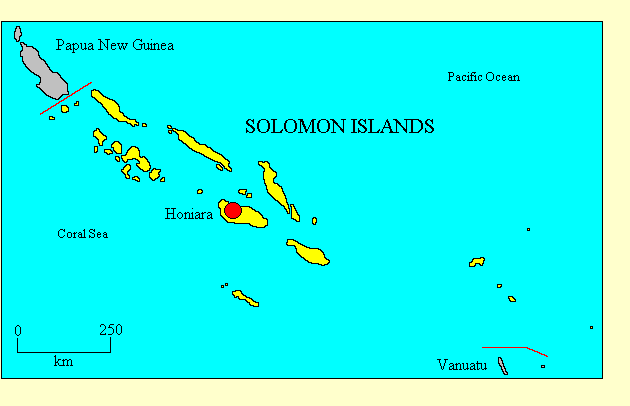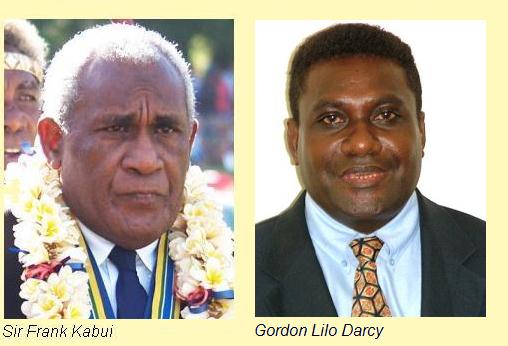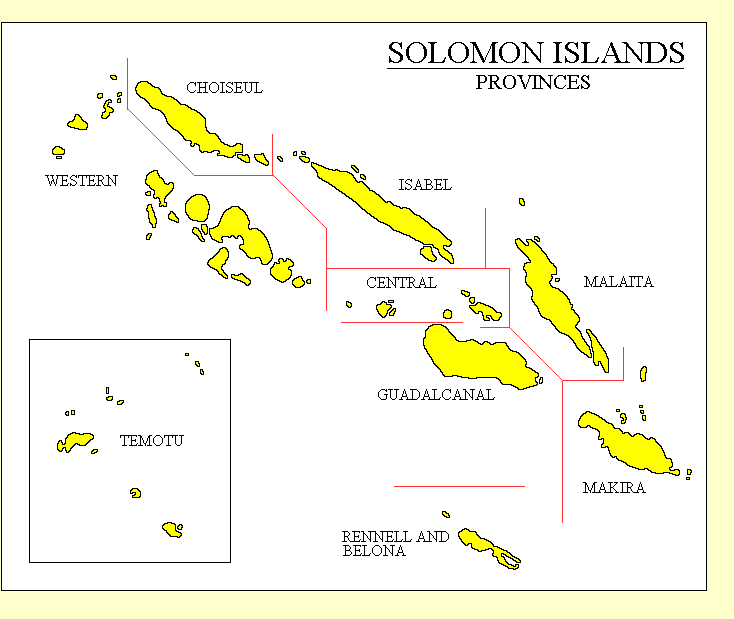
SOLOMON ISLANDS• Official name: Solomon Islands
In the 1990s a long-simmering land dispute broke out on Guadalcanal between the islanders and people from the island of Malaita. The country's fragile economy and infrastructure collapsed into near anarchy and civil war. The resulting crisis led the Solomons government to ask for Australian assistance, and Australian military, police and civilian agencies took control of the country's administation. Successful elections were held in 2001.  Following the 2006 elections, however, there were allegations of bribery which led to rioting in the capital. The
new Prime Minister, Snyder Rini, resigned, and his successor, Manasseh Sogavare, became embroiled in controversy
and conflict with the Australian representatives. His high-handed actions led to his
removal by the Parliament in November 2007. The next Prime Minister, Derek Sikua, managed to stabilise the situation.
Following the 2010 elections, which were fairly successful, Danny Philip became Prime Minister. He was
forced out by corruption allegations in November 2011, and replaced by
Gordon Lilo Darcy.
Following the 2006 elections, however, there were allegations of bribery which led to rioting in the capital. The
new Prime Minister, Snyder Rini, resigned, and his successor, Manasseh Sogavare, became embroiled in controversy
and conflict with the Australian representatives. His high-handed actions led to his
removal by the Parliament in November 2007. The next Prime Minister, Derek Sikua, managed to stabilise the situation.
Following the 2010 elections, which were fairly successful, Danny Philip became Prime Minister. He was
forced out by corruption allegations in November 2011, and replaced by
Gordon Lilo Darcy.
Solomon Islands has a very weak party system, with 20 of the 50 seats in the Parliament being held by independent members, and only one party having more than ten seats. The major parties include the Democratic Party, the Reformed Democratic Party and OUR Party. Freedom House's 2011 report on Solomon Islands says: "The Solomon Islands are not an electoral democracy... While several political parties operate, political activity is driven more by personalities and clan identities than party affiliation. Also, shifting alliances within the parliament remain a source of political instability... Rampant corruption at all levels of government is a major source of public discontent and hinders economic development... Freedoms of expression and the press are generally respected, but politicians and elites sometimes use legal and extralegal means to intimidate journalists... The constitution guarantees freedom of assembly, and the government generally recognises this right... Threats against judges and prosecutors have weakened the independence and rigor of the judicial system. Judges and prosecutors have also been implicated in scandals relating to corruption and abuse of power. A lack of resources limits the government’s ability to provide legal counsel and timely trials... Domestic security and law enforcement are provided by a civilian-controlled police force of about 1,000 people, but poor training, widespread abuse of power, and factional and ethnic rivalries have undermined public trust in the service." Updated November 2010 |
